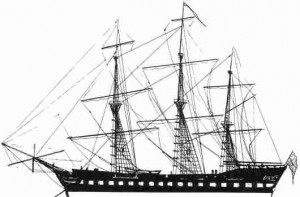- Author
- Lind, L.J.
- Subjects
- Biographies and personal histories
- Tags
-
- RAN Ships
- None noted.
- Publication
- December 1971 edition of the Naval Historical Review (all rights reserved)
The Providence and John Paul Jones soon proved a deadly combination. In the period of a few months on one voyage sixteen British ships fell to the guns of Providence. Eight were either sunk or burnt, and eight were taken to rebel ports as prizes. This success did not pass unnoticed. The Continental Congress placed Jones in command of a squadron with the Alfred as his Flagship.
In the early part of 1777, Congress decided to take the war to England. Jones was appointed Captain of Ranger on 18th June. He sailed for France later that year, and on 14th February 1778, in Quiberon Bay, the French became the first nation to recognise the American Flag.
Jones’ orders were to launch raids on British ports and shipping in those ports. The audacity of the commission was in keeping with the Scot’s character.
Ranger sailed from Brest on 11th April 1778, and eleven days later he bombarded Whitehaven and landed a party which spiked the guns of the harbour fortifications. All shipping found in the port was fired, and Jones retreated without damage or casualty.
While the British reeled in disbelief at the utter gall of the American upstart, Ranger struck again. On the very next day, she attacked St. Mary’s with the same disastrous results to the British.
Turning for France, Jones intercepted the British warship Drake and attacked. Drake won the doubtful honour of being the first foreign man-o-war to surrender to an American Ship.
The Ranger departed for America on 21st August 1778, but Jones remained in France. King Louis XVI presented the American captain with the Duc De Duras, an ancient East Indiaman of 40 guns. Jones refitted his new ship at L’Orient and renamed her Bonhomme Richard.

The name Bonhomme Richard was a tribute to Jones’ close friend, Benjamin Franklin. Franklin had at the time published a French edition of Poor Richard’s Almanac which appeared as La Science du Bonhomme Richard.




